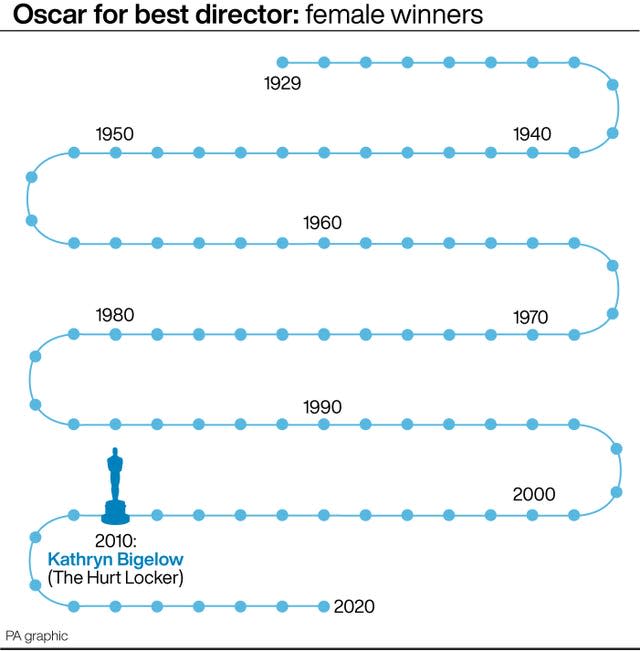Record-breaking nominations set stage for historic Oscars night
This year’s Academy Awards could deliver some history-making moments, thanks to a slate of nominations that have smashed records for diversity and representation.
A total of nine of the 20 acting nominees are non-white, including three of the five nominees in the categories of best actor and best supporting actor.
This is the most ethnically diverse line-up in the 93-year history of the Oscars, and is a major turnaround from last year when just one of the 20 nominees was non-white.
If either Viola Davis or Andra Day win best actress, it will be only the second time this award has gone to a non-white performer.
The first – and so far only – non-white winner was Halle Berry in 2002, for the film Monster’s Ball.

Davis is nominated for Ma Rainey’s Black Bottom, while Day is nominated for The United States Vs Billie Holiday.
The other nominees are Vanessa Kirby (Pieces Of A Woman), Frances McDormand (Nomadland) and Carey Mulligan (Promising Young Woman).
In the best actor category, Riz Ahmed (for Sound Of Metal), Chadwick Boseman (Ma Rainey’s Black Bottom) and Steven Yeun (Minari) are all nominated, along with Sir Anthony Hopkins (The Father) and Gary Oldman (Mank).
There is a similar non-white/white split in the supporting actor category, with Daniel Kaluuya (Judas & The Black Messiah), Leslie Odom Jr (One Night In Miami…) and Lakeith Stanfield (Judas & The Black Messiah) all nominated, plus Sacha Baron Cohen (The Trial Of The Chicago 7) and Paul Raci (Sound Of Metal).
The least diverse category is supporting actress, with just one non-white nominee: Yuh-Jung Youn (Minari).
The others are Maria Bakalova (Borat Subsequent Moviefilm), Glenn Close (Hillbilly Elegy), Olivia Colman (The Father) and Amanda Seyfried (Mank).
To date, non-white performers have never triumphed in all four acting categories in the same year.
There has also never been an Academy Awards at which non-white performers have won best actor, best actress and best supporting actor at the same time.
This year’s ceremony offers the best chance in the history of the Oscars of one or even both of these scenarios coming true.
The first non-white performer to win an acting Oscar was Hattie McDaniel, who won best supporting actress in 1940 for Gone With The Wind.
Along with McDaniel, there have been non-white winners in the acting categories a total of 19 times: five for best actor, once for best actress, five for best supporting actor and eight for best supporting actress.

Another milestone could be reached this year in the category of best director, which could see a woman pick up the award for only the second time.
Emerald Fennell (for the film Promising Young Woman) and Chloe Zhao (Nomadland) are both nominated, along with Thomas Vinterberg (Another Round), David Fincher (Mank) and Lee Isaac Chung (Minari).
Remarkably, 2021 is the first time more than one woman has been nominated for best director in the same year.
Moreover, Fennell and Zhao are only the sixth and seventh women in the history of the Academy Awards to get a best director nomination.
The previous nominees were Lina Wertmuller (for Seven Beauties in 1977); Jane Campion (The Piano, 1994); Sofia Coppola (Lost In Translation, 2004); Kathryn Bigelow (The Hurt Locker, 2010); and Greta Gerwig (Lady Bird, 2018).
Bigelow is the only woman to ever win best director.

Zhao is the first non-white woman to be nominated for best director, while Fennell is the first woman to be nominated for her feature film directing debut.
Zhao is also the first woman to receive four nominations in a single year: best director, best film editing, best adapted screenplay and best film.
Finally, Boseman could become only the second person in the history of the Academy Awards to receive a posthumous award for best actor, for his role in Ma Rainey’s Black Bottom.
Peter Finch is the only other person to win best actor posthumously (for Network in 1977), while Heath Ledger won the award for best supporting actor posthumously in 2009, for The Dark Knight.

 Yahoo Movies
Yahoo Movies 
